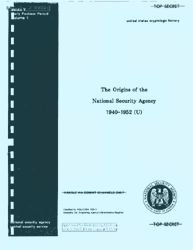Nixon and Kissinger developed a close personal relationship that profoundly affected the way in which they conducted their foreign policy. On many days they met together alone or with only a handful of aides present for hours, and they spoke at length to one another on the phone. They criticized officials, members of Congress, journalists, and the public. Each man came to office deeply suspicious of elected officeholders, foreign affairs officials, or members of the public who commented on foreign affairs. Nixon was uncomfortable with most people, hating direct disagreement or confrontation with subordinates. He believed that most permanent officials in the government opposed him and his policies. He told his cabinet in 1971, "we’ve checked and found that 96 percent of the bureaucracy are against us; they’re bastards who are here to screw us."537
Kissinger was a surprising member of Nixon’s inner circle because he had supported Nelson Rockefeller, Nixon’s rival for the presidency. In addition, he had taught at Harvard and written extensively for the Council on Foreign Relations, two of the principal institutions of the Eastern establishment that Nixon distrusted. Unlike Nixon, Kissinger could be highly personable, and during his tenure as national security adviser and secretary of state, he often had excellent relations with news reporters. He had, however, other reasons to want to work behind the scenes. He quickly realized that the more he and Nixon spoke to one another, the more indispensable he seemed to become, especially when Kissinger joined the president in complaining about the inadequacies of others.
Kissinger’s academic writings belonged to the Realist school of foreign-policy analysis. His research added to his sense that most Americans could not be trusted to understand foreign affairs or to support what he believed to be a foreign policy that promoted American interests. Among the major tenets of Realism are the ideas that power matters most in international relations; ideology has little importance. Regrettably, fTom Kissinger’s point of view, Americans paid too little attention to power relations in international affairs, and they stressed too often unworkable moral maxims or legalistic formulations. In 1968, he disparaged the idealism of American youth who "considered the management of power irrelevant, perhaps even immoral." A generation gap had opened between students opposed to American participation in the war in Vietnam and their elders whose remembered lesson of World War II was the danger of unchecked aggression. "Partly as a result of the generation gap," Kissinger wrote, "the American mood oscillates dangerously between being ashamed of power and expecting too much of it."538
During the 1960s, public discussion of Soviet-American relations often focused on efforts to cap the nuclear-arms race. Kissinger, however, expressed skepticism that arms-control agreements by themselves would reduce tension between the two nuclear superpowers. Concentration on arms control, he believed, got the story backward. Improved political relations, he argued, would lead to arms control. But since there was such widespread public support for arms control, Kissinger pursued it.
Nixon and Kissinger sought to embed US-Soviet agreements on arms control in a larger web of mutual interest. At his first press conference on February 6,1969, Nixon explained that the United States wanted to go forward with the Soviets on political agreements and arms control. This policy became known as "linkage," in which the US government would connect progress in different areas. Kissinger explained that Nixon meant linkage to convey the idea that "there be enough movement in the political field to indicate that arms control negotiations do not unwittingly, instead of reducing the danger of war, offer a means by which conflict can be intensified."7
At its most ambitious, the Nixon administration expected that progress toward better bilateral relations with the Soviet Union would encourage the leaders ofthe Kremlin to apply pressure on the government ofthe Democratic Republic of (North) Vietnam to agree to end the Vietnam War on terms the Americans would accept. These hopes proved to be illusory. The Soviet Union did not push North Vietnam very hard, and the North Vietnamese could resist Soviet pressure since they also enjoyed the backing of the PRC, Moscow’s rival for leadership in the Communist world. Nixon and Kissinger hoped to exploit this intra-Communist rivalry through “triangular diplomacy" among Washington, Moscow, and Beijing.
Triangular diplomacy failed in its original goal of gaining Soviet and Chinese pressure on Hanoi to settle the war in Vietnam on terms agreeable to the United States. Triangular diplomacy did, however, expand US-Soviet detente. American steps toward detente with the Soviet Union proceeded side by side with secret efforts to open relations with China. This behind-the-scenes diplomacy culminated in Kissinger’s trip to Beijing in July 1971, which paved the way for a celebrated visit by Nixon to China in February 1972. Soviet officials observed the burgeoning US-PRC rapprochement with alarm. They often warned Nixon and Kissinger against making friends with the Chinese at the Soviets’ expense. Nixon and Kissinger offered only tepid reassurances to the Soviet leadership that closer ties between Washington and Beijing would not harm Soviet interests. As the United States and China ended their decades’-long estrangement in 1971 and 1972, Soviet leaders became more inclined than they had been before to reach agreements with the United States.
Nixon and Kissinger built upon their views of politics and international affairs to develop detente. They responded to public anxieties about the costs and the dangers of the continuing confrontation between the United States and the Soviet Union. Their methods became as important as their goals. They built their structure ofpeace in a way that shut out professional diplomats and cabinet secretaries ostensibly in charge offoreign affairs. Their tight control of foreign policy led to dramatic and unexpected breakthroughs. But their antagonism toward professional advisers also left them without vital support when opponents criticized detente.




 World History
World History









